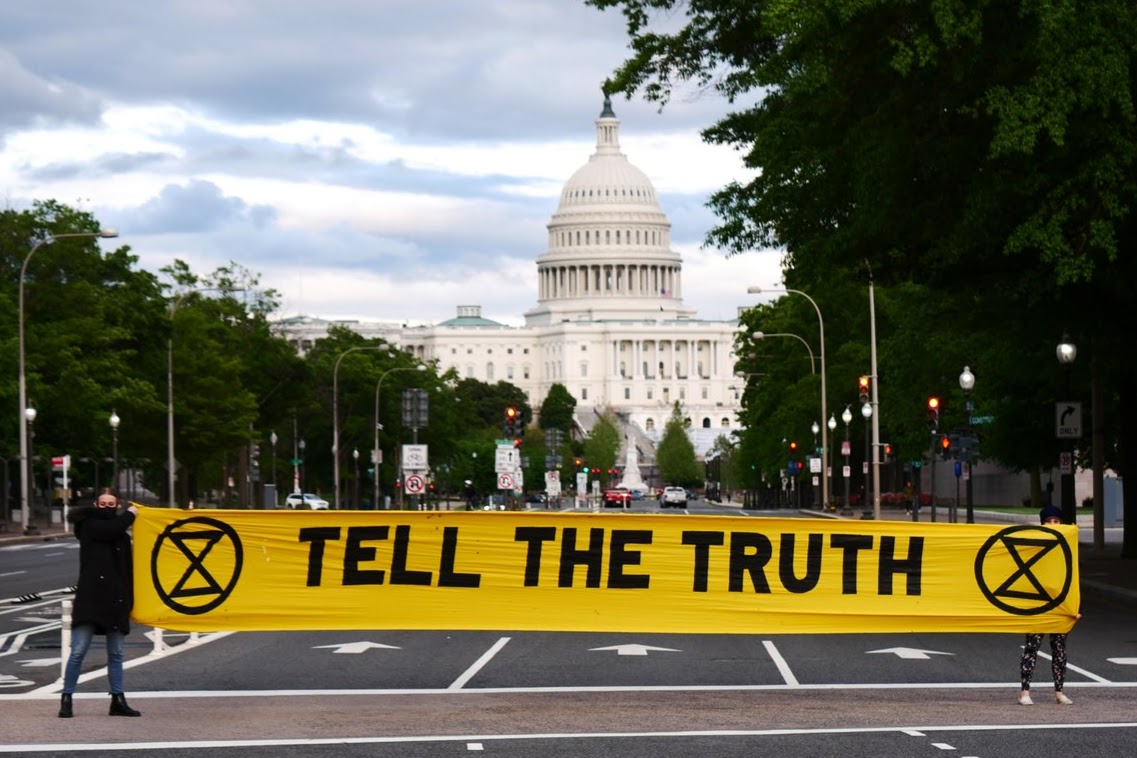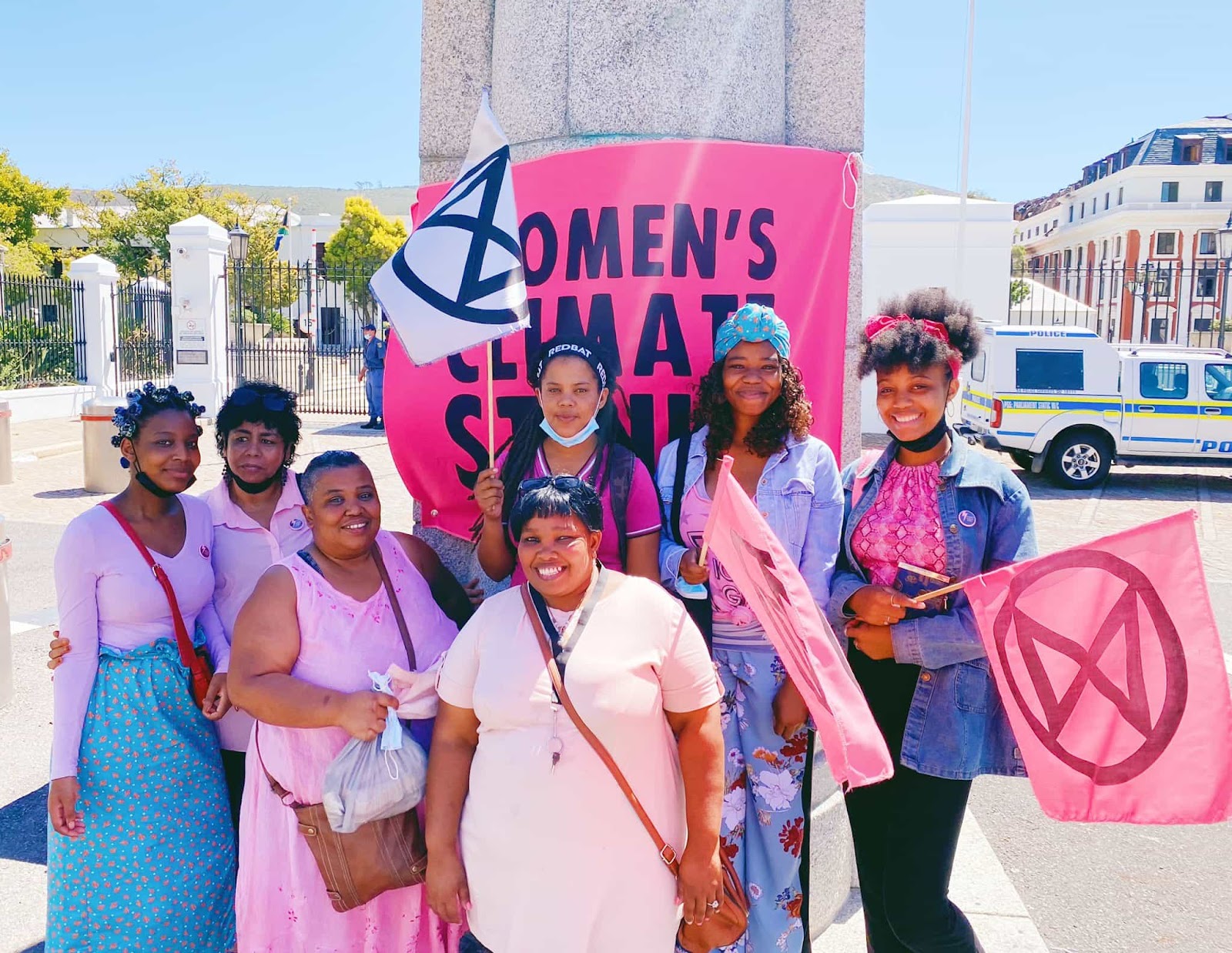
Women gather in Cape Town, South Africa for the Women’s Climate Strike.
In this issue: Women’s Climate Strike | A Letter From XR Ukraine | New IPCC Report
Introduction
Dear rebels,
Disparities in wealth and lifestyle on our planet can be stark, and women from different parts of the world might hardly share a lived experience at all. Yet women are consistently affected more by climate change than men, particularly in the global south.
Study after study has shown that women are more likely to be displaced by and even die in climate related disasters.
The reasons for this are many, and further explored in Must Reads, but generally speaking it is because women have less power in society, and earn less money. Women are often the primary providers of food, water, and care for their families. This work is vital for society to function, yet it is not valued by economies shaped by centuries of patriarchy.
A group of women climate activists in Glossop, England were tired of seeing women overlooked at climate conferences and underrepresented across global politics. They started forging links with women activists around the world, learning about their different experiences, and planning a global action for International Women’s Day. The Women’s Climate Strike was the rebellious result, and you can read all about it in Action Highlights.
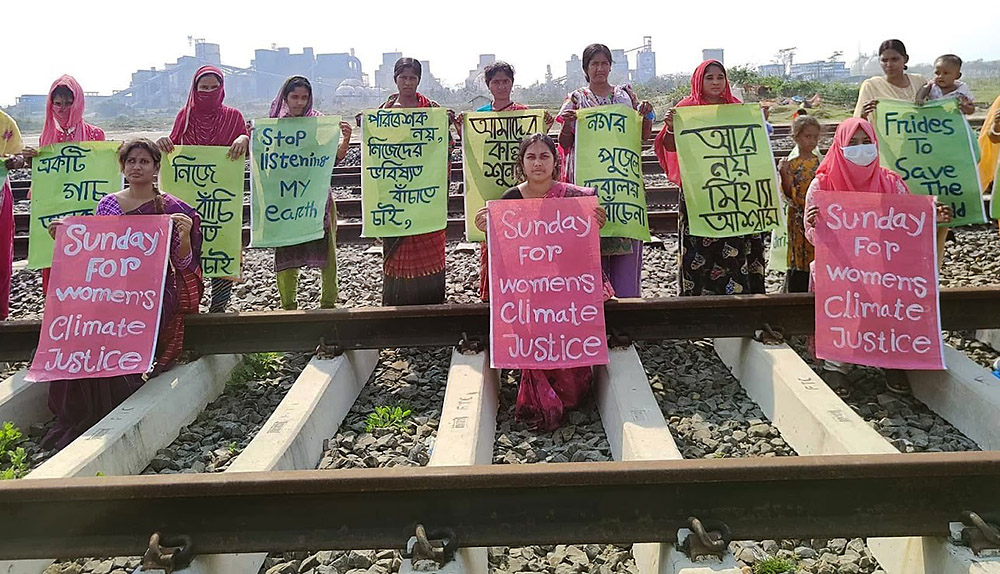
BINDU, a feminist organisation in Bangladesh, took part in the Women’s Climate Strike.
There you can also find out what XR Ukraine wants us to do to help stop the Russian war machine. It has been disconcerting watching the Western media fascinate over this war while ignoring war crimes elsewhere. But the blanket coverage has highlighted how oil and gas finances war, and will hopefully make demands to quit fossil fuels more widespread.
The media’s focus on Ukraine certainly reduced the impact of the new IPCC report, the subject of our final story this month. The chilling assessment states that on our current trajectory, large swathes of land, chiefly in Africa, will become uninhabitable within decades.
This month’s stories make clear that for our world to thrive, we must all strive to extend our solidarity outwards - beyond our direct neighbours, across continents, and across genders. We hope this issue of the newsletter plays a small part in doing that.

XR Ukraine during more peaceful times at a rally in Kyiv, September 2021.
Get involved in XR wherever you are! Check out our global website, learn more about our movement, and connect with rebels in your local area.
The Global Newsletter is brought to you by XR Global Support, a worldwide network of rebels who help new XR chapters grow. Read previous issues here.
We are in a crucial phase of human history, and we need money to make our message heard. Anything you can give is appreciated.
Contents
- Action Highlights: Women’s Climate Strike, XR Ukraine, IPCC Report
- Action Roundup: Sweden, Argentina, Indonesia, Scotland, Tanzania, South Africa, and more in Newsletter XTRA
- Upcoming Actions: Global Climate Strike, Senegal World Water Forum, Scientist Rebellion, UK Rebellion, Brussels Rebellion
- Announcements: Solarpunk Storytelling Showcase, XR Podcast, Gitcoin Fundraiser
- Must Reads: Women’s Climate Strike Special
- Book of the Month: Animal, Vegetable, Miracle by Barbara Kingsolver
- Women of XR: Shamim, Tanzania
Action Highlights
Women’s Climate Strike: Global Voices Heard
8 MARCH | Worldwide
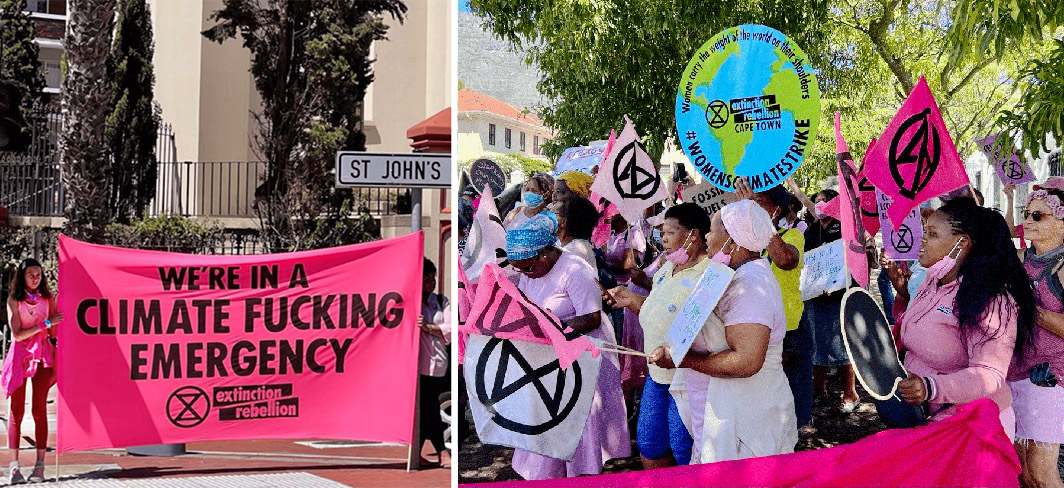
South African women rally at their parliament in Cape Town for the Women’s Climate Strike.
To mark International Women’s Day, a grassroots network of women activists (including rebels) held a series of unique protests and community events around the world.
The Women’s Climate Strike saw women protesting in front of their parliaments in London, Edinburgh and Cape Town, and launching actions from Bangladesh to Portugal that amplified women's voices and bridged women communities.
XR Uganda visited Naposhi, a remote village in the Eastern Region, so the women there could speak directly about life on the frontline of the climate crisis. Their area has been devastated by landslides and floods after a decade of increasingly heavy rains.
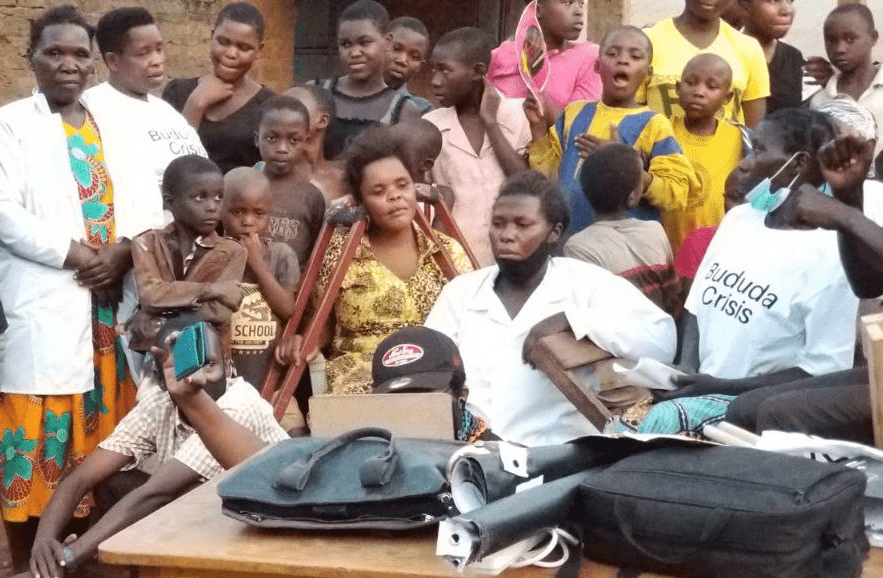
Women and children of Naposhi village, Uganda, take part in a Zoom meeting for the Women’s Climate Strike.
With no local roads or electricity to rely on, Ugandan rebels brought a generator and laptop to set up a Zoom meeting. An international audience listened as the women gathered around the computer and gave harrowing accounts of a landslide that caused flood waters to wash away several local villages, killing 73 and displacing more than 1000 people.
The cataclysmic event happened in 2019, but for the women it clearly felt like only yesterday. Many are still homeless, struggling with injuries, and mourning family members lost in the flood. They have received no help from their government, nor an opportunity to relocate to a safer area.
The eye-opening event crystallised how many communities are one climate disaster away from long term devastation, and how the political imperative to adapt to the climate crisis is meaningless for those communities denied even basic state support.
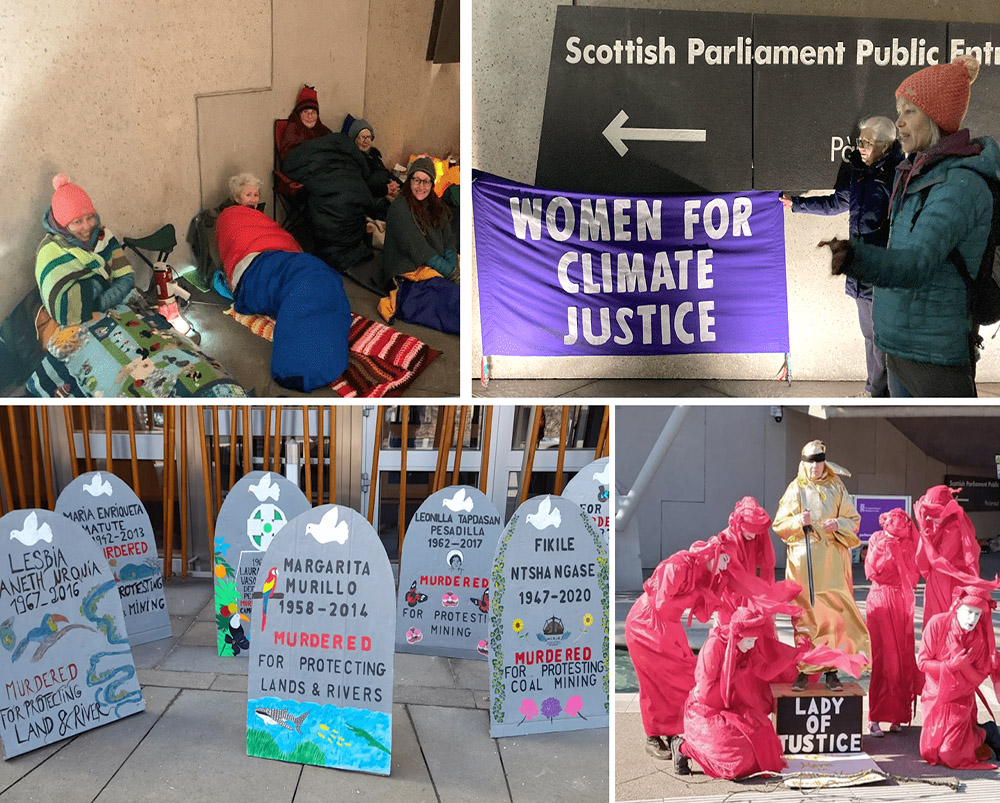
A 24hr vigil was held in front of the Scottish Parliament in Edinburgh to commemorate women activists murdered for defending our planet.
Inspired by Fridays For Future, the Women’s Climate Strike movement began as a weekly protest by women in Glossop, a small town in England. The group was tired of seeing women sidelined during climate conferences and across politics in general, and used regular Zoom meetings to build an international network of women activists.
They framed their global day of action under the banner 'The Wait of the World' to highlight how women, particularly those living in the global south, bear the weight of the climate crisis, yet are also excluded from political processes and so left waiting for the world to act.
XR Ukraine: End Russian Fossil Fuels
24 FEB | Ukraine

Top: The first meeting of XR Ukraine & FFF Ukraine in November 2021. Bottom: One of the coordinators on a sleeper train, evacuating from Kharkiv to Kyiv in February 2022. “I was fighting against the Climate Crisis. Now I am fleeing a war caused by fossil fuels.”
On the day that Russian tanks rolled into their country, XR Ukraine sent an open letter to other rebel groups, urging them to blockade the offices of Gazprom, Rosneft and other Russian companies that supply oil, gas and coal to the EU. The letter calls out EU governments, and Germany in particular, for their dependence on Russian fossil fuels.
Fossil fuels are a main source of income for the Russian government, meaning they are directly funding the invasion of Ukraine. The EU, UK and US collectively spend more than $700m a day buying Russian oil and gas. This makes fossil fuels not only an existential threat to world ecology, but also to world peace.
XR groups across Europe responded to the call, and the past weeks saw rebel solidarity actions outside Gazprom offices and fossil fuel infrastructure in Germany, Finland, France and the Netherlands.
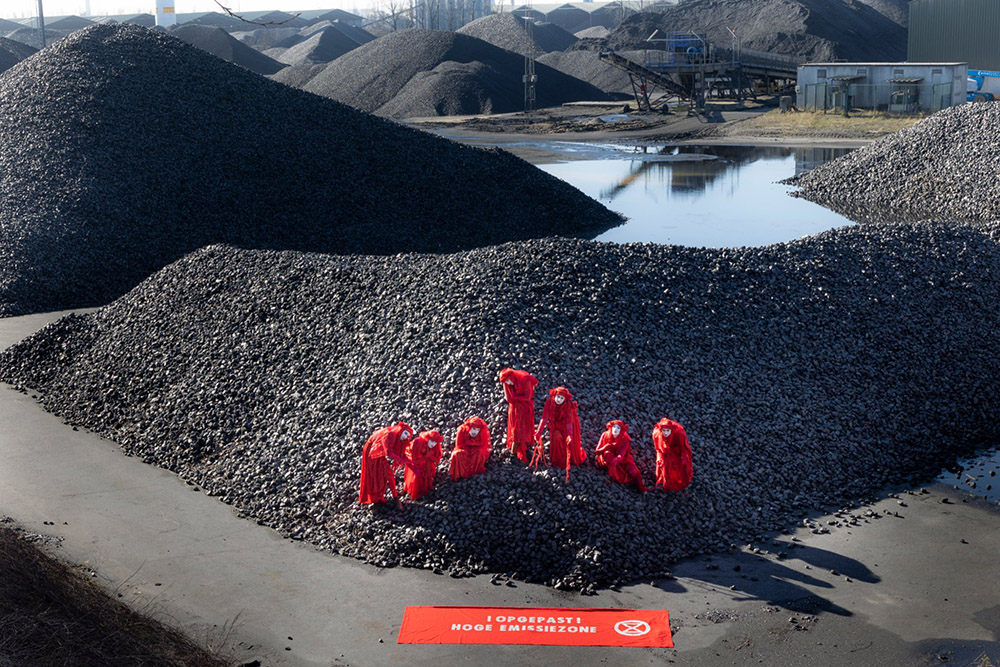
Red rebels at the Belgian port of Ghent. 6.2 million tons of Russian goods arrived there last year, including vast amounts of coal. Photo: Lieve Blancquaert.
Russians have also been protesting against the war, and arrested in their thousands for it. State repression has become so bad that even children have been detained by police, and new laws could see peaceful anti-war protesters jailed for up to 15 years.
XR Ukraine was founded in the summer of 2019 and is a small chapter, with a handful of core coordinators. They have worked closely with Friday’s For Future Ukraine on a number of actions, and recently shifted their main communication channel to Instagram. If you want to help organise Ukraine solidarity actions in your area, and coordinate with other countries, then join the Ukraine Working Group on Signal.
Delay Means Death: IPCC Report Released
28 FEB | Worldwide
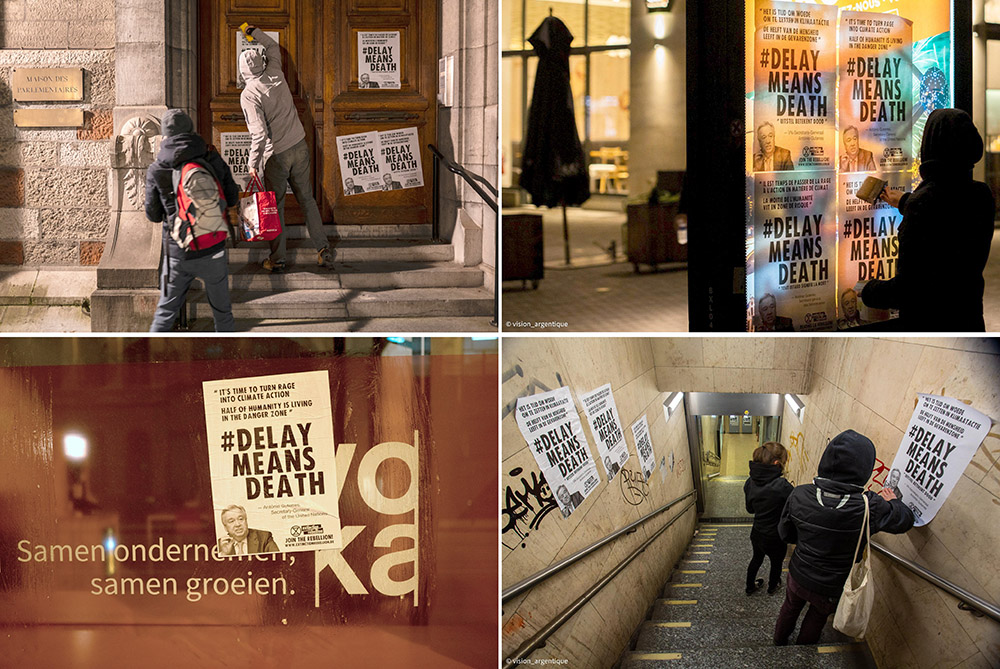
Rebels in Brussels put up posters quoting the UN Secretary General verdict on the new IPCC report.
The latest Intergovernmental Panel on Climate Change (IPCC) report has been released after seven years of work by thousands of climate scientists. And it’s terrifying stuff. Read this in-depth Q&A for a detailed yet accessible summary of the report’s findings.
Focusing on the impacts of climate change and the capacities (and limits) of human adaptation, the UN report’s conclusions are dire. No inhabited region on Earth will escape the climate crisis. Half of the world’s population live in areas “highly vulnerable” to climate change. And the window to secure a “liveable future” is rapidly closing.
The report made a noteworthy mention of ‘loss and damage’ - which refers to impacts of climate change that can't be adapted to, and which Global North governments refuse to acknowledge because it could lead to huge compensation payouts to the Global South. The endorsement by the IPCC will give vulnerable nations a boost in future climate talks.

Police dismantle a giant 1.5° symbol during a rebel blockade of a Berlin bridge after the release of the IPCC report.
The UN Secretary General called the report “a damning indictment of failed climate leadership”, stressing that “every second counts” in the race to slash emissions. Rebels around the world, armed with love and rage, took to the streets to make sure the public knew about this criminal abdication of leadership.
Highlights include rebels in Berlin erecting a huge 1.5°sculpture on a central bridge (and proclaiming it dead) and rebels in Brussels going on an overnight poster campaign that saw ‘Delay Means Death’, a quote from UN Secretary General, appear all over the city.
Action Roundup

Left: A rebel at Bromma airport in Sweden gets arrested on the runway. Right: Rebels unveil a banner (Green flights do not exist) in Copenhagen’s Kastrup airport.
26 - 28 FEB | Sweden & Denmark Scandinavian rebels joined forces to launch one of the largest actions against the aviation industry, ever. XR Sweden organised a wave of airport actions across the country, while XR Denmark focused on Kastrup airport in Copenhagen.
Their combined efforts resulted in seven airports being disrupted and six planes being grounded. While some rebels occupied planes or glued themselves to runways, others held die-ins and demonstrations in departure lounges.
The rebels decided to announce their plans in advance, increasing the safety of the actions and ensuring that media coverage started early. Although the heightened security led to some rebels being stopped prematurely, the actions still had an immense impact on the airports.
Scandinavian governments spend vast sums subsidising their aviation sectors, money that should be spent immediately mitigating the climate crisis.
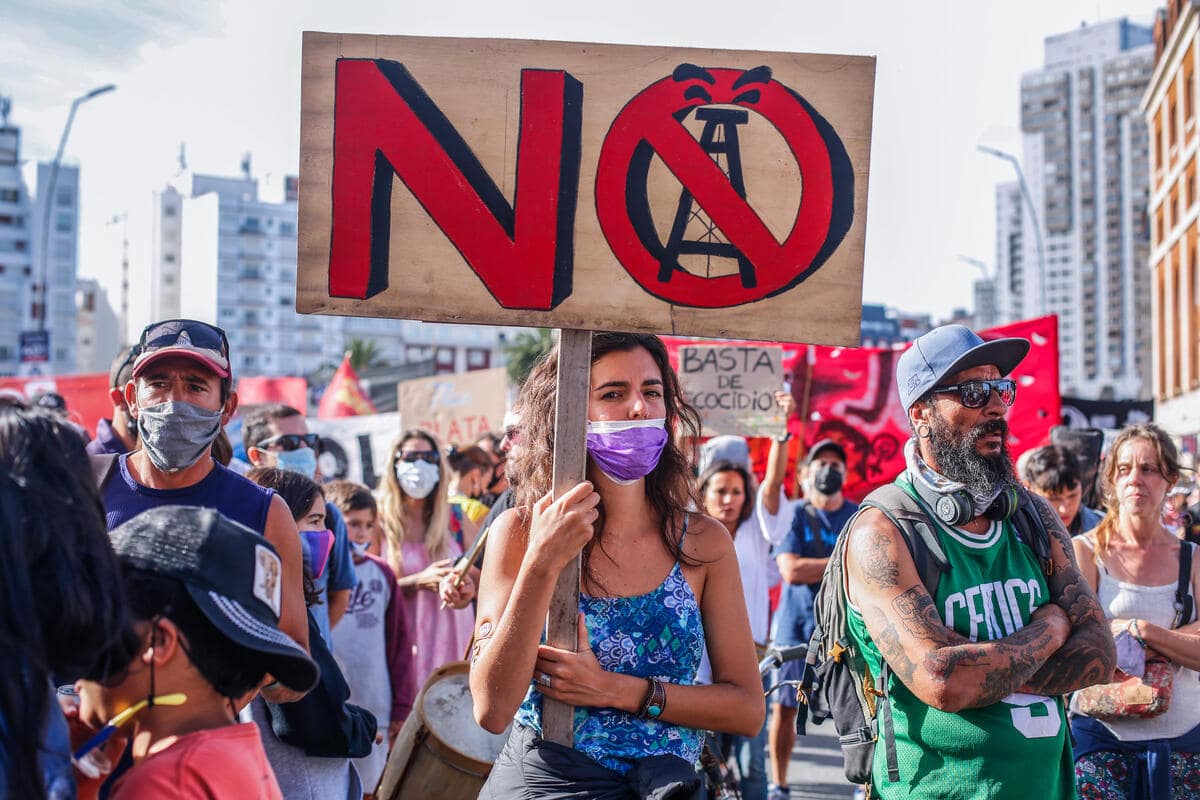
11 FEBRUARY | Mar Del Plata, Argentina People power! Days after the Global Coastal Rebellion that saw an alliance of activists rise up to protect their oceans from extractivism, an Argentinian court suspended all oil exploration off the country’s coast. Photo: Diego Izquierdo / Greenpeace

12 FEB | Makkassar, Indonesia Rebels drummed and marched through Makkassar city to spread the word about our movement and our three demands.

25 FEB | Edinburgh, Scotland An alliance of activists including rebels disrupt a lavish dinner organised by the Scottish Energy Forum for the oil and gas industry.
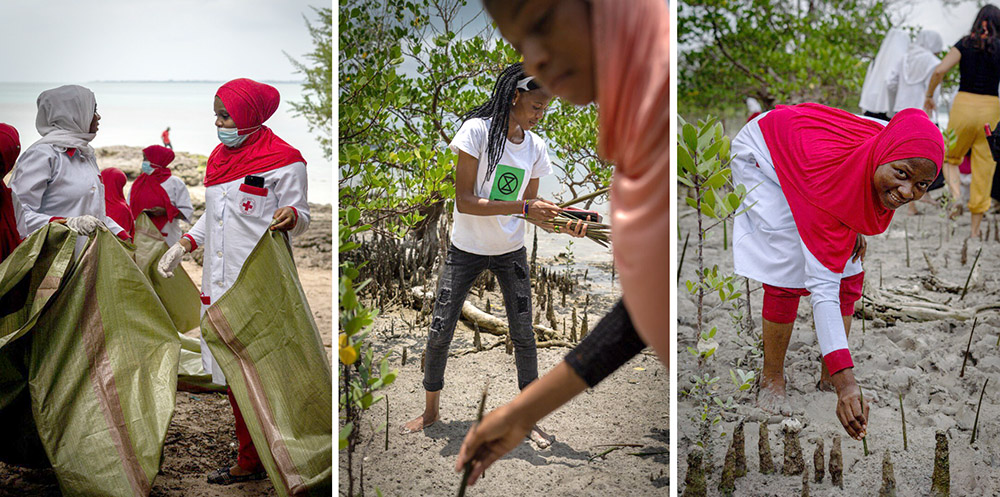
25 FEBRUARY | Zanzibar, Tanzania Women rebels spent the day beach-cleaning and mangrove tree planting to celebrate International Women’s Day and the upcoming International Day of Forests.

1 MARCH | Capetown, South Africa Victory! After ruling against Shell’s appeal to conduct seismic blasting along the eastern Wild Coast in February, the Cape Town High Court also ruled against a data company conducting seismic blasting along South Africa’s west coast.
So many rebel actions happened this month we can’t fit them all into one newsletter. Head over to Newsletter XTRA to find out about actions in Italy, France, Hawaii, Democratic Republic of Congo, Australia, Wales & more. Newsletter XTRA: A feast for the eyes and extra fuel for the soul!
Upcoming Actions
Global Climate Strike
25 MARCH | Worldwide
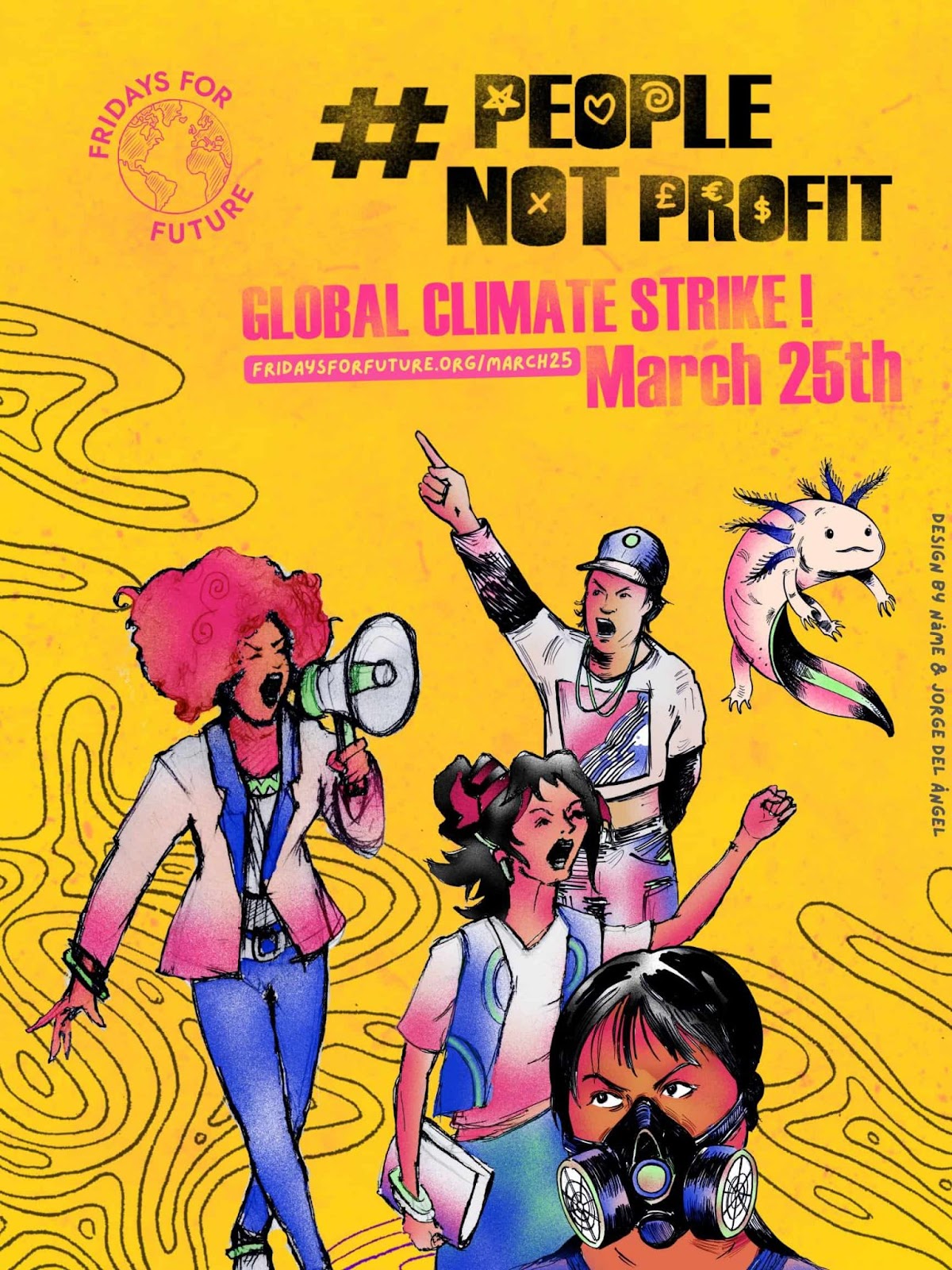
On March 25th, Fridays For Future will strike for climate reparations and justice!
Join us for the Global Climate Strike as we demand that policymakers and world leaders prioritise people not profit! Find out more.
World Water Forum: XR Africa Actions
20 - 25 MARCH | Africa
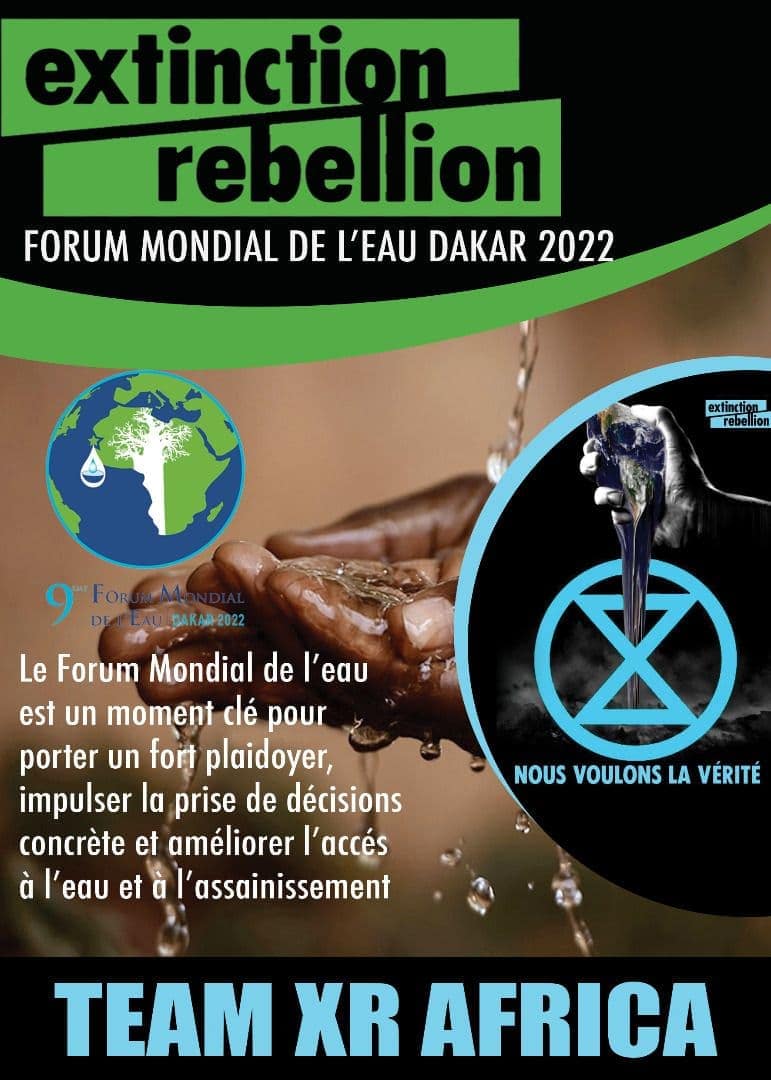
This year the World Water Forum will be held in Dakar, Senegal. This is the first time the event will be hosted in Sub-Saharan Africa.
XR groups across Africa are organising various actions during the event to highlight how the region is being impacted by the water crisis. Key upcoming actions include a Water Crisis Talk, a People's Assembly and a Climate March.
According to the World Health Organisation, one in three people globally still do not have access to safe drinking water. So let’s come together to spotlight this crisis, and stop corporate criminals trading away a sacred resource that was never theirs to begin with!
For more info, subscribe to the XR Africa Newsletter or email: [email protected]
Scientist Rebellion: Let’s Take Back The University!
4 - 9 APRIL | Worldwide

Scientist Rebellion is calling for the largest global scientific and academic strike in history. We demand immediate and radical action in the face of the Climate Emergency. Simultaneously, we propose the Take Back the University campaign to the student body.
Find out more about the planned strikes and disobedience, and join over 1000 scientists and academics on the streets across all continents in April.
XR UK: Join The London Rebellion!
9 - 17 APRIL | 10:00 | Hyde Park, London, UK
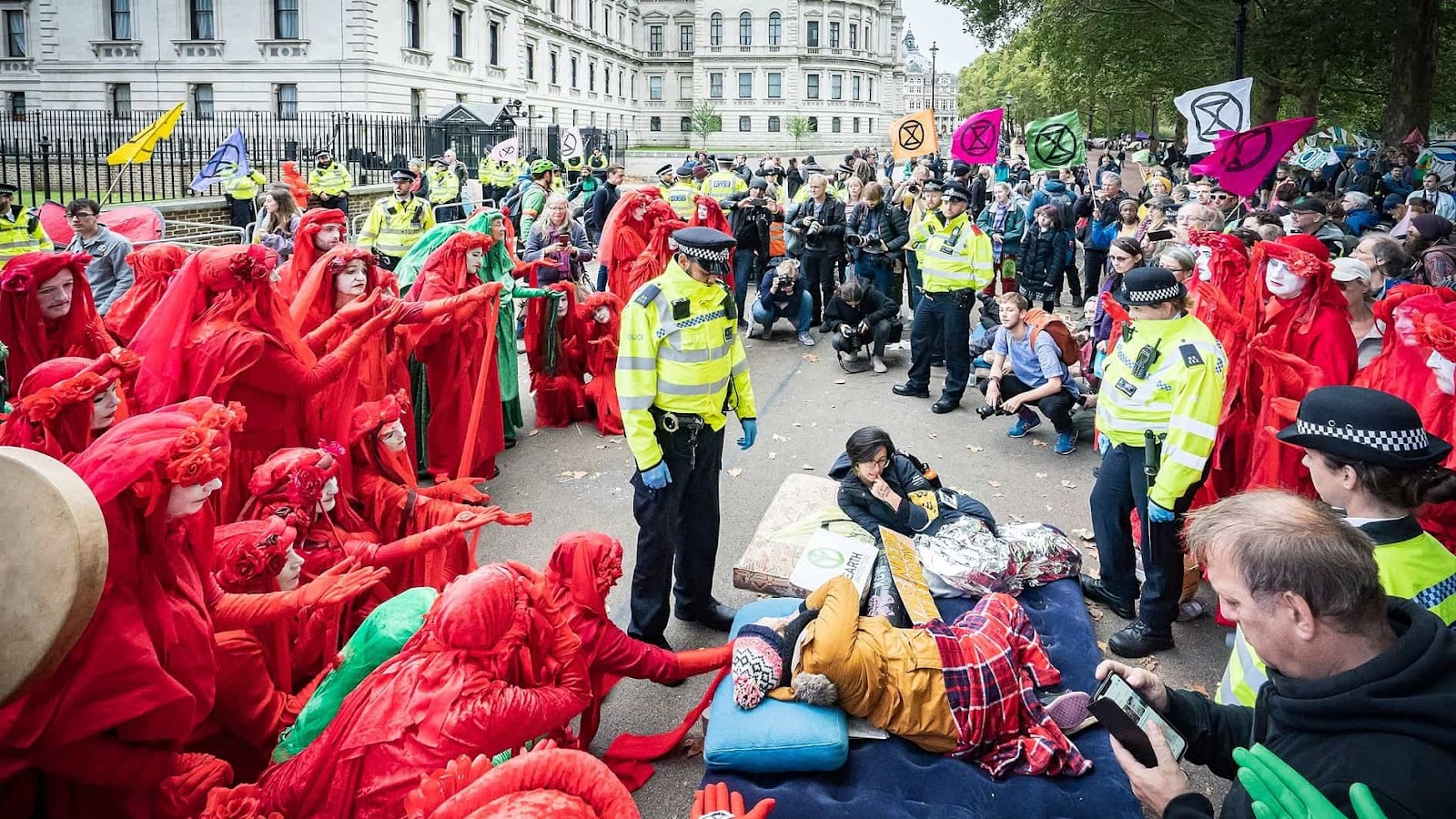
XR UK is rising up in Rebellion for one week, with civil resistance continuing on at least three weekends thereafter!
This Rebellion will be different: we’ll focus on a high-profile fossil fuel target, use a clear message, and invite all rebels to unite under one aligned plan. We’ll make our immediate demand politically unavoidable!
Click “going” on the Facebook event and invite your friends. Step up into resistance: commit to the April Rebellion and donate to our fundraiser. Stand up in solidarity with people around the world defending their lives, lands & cultures.
Join us on the streets in April.
Brussels Rebellion
22 JUNE | Brussels, Belgium

An international XR Day of Action is being organised in Brussels this June. If you want to hear more, join us for a preparatory Zoom Meeting.
The Zoom Meeting will take place on Friday 18 MARCH at 18:00 CET.
We would love to see you there! Let's take on Brussels together, rebels!
Announcements
.
Solarpunk Storytelling Showcase: Website is LIVE

XR Wordsmiths is excited to announce that the Solarpunk Storytelling Showcase website is now LIVE, and hosted on a solar-powered server!
Read the winning stories accompanied by beautiful artwork at solarpunkstorytelling.com
We are working on our next Solarpunk Showcase, and hoping this one can happen in languages other than English. If you're interested in helping run a Showcase in a non-English language please get in touch: [email protected]
XR Podcast: Listen Now!

This month’s episode features an interview with the eminent Indian novelist and environmental thinker Amitav Ghosh, who discusses his new book, ‘The Nutmeg’s Curse: Parables for a Planet in Crisis’.
XR Gitcoin Fundraiser: Donate Now!

XR Global Support has partnered with Gitcoin for a Quadratic Funding grant round.
Gitcoin is a community platform where open-source code meets open economies to build digital public goods for all. Quadratic Funding is the optimal way to fund public goods in a democratic community. The number of supporters multiplies the amounts received!
Our Tech team will use funds raised to help our ‘whistleblower’ page go live; build an impenetrable firewall; provide a safe, free webmail that doesn’t work with governments; host websites for hundreds of XR global groups; support translation services and so much more.
Our crypto donations are happening mostly via lower footprint currencies and being involved in this field allows XR to help shape its future development. Check out our interactive pitch deck for more details.
Donate crypto now or just good old-fashioned cash.
Must Reads
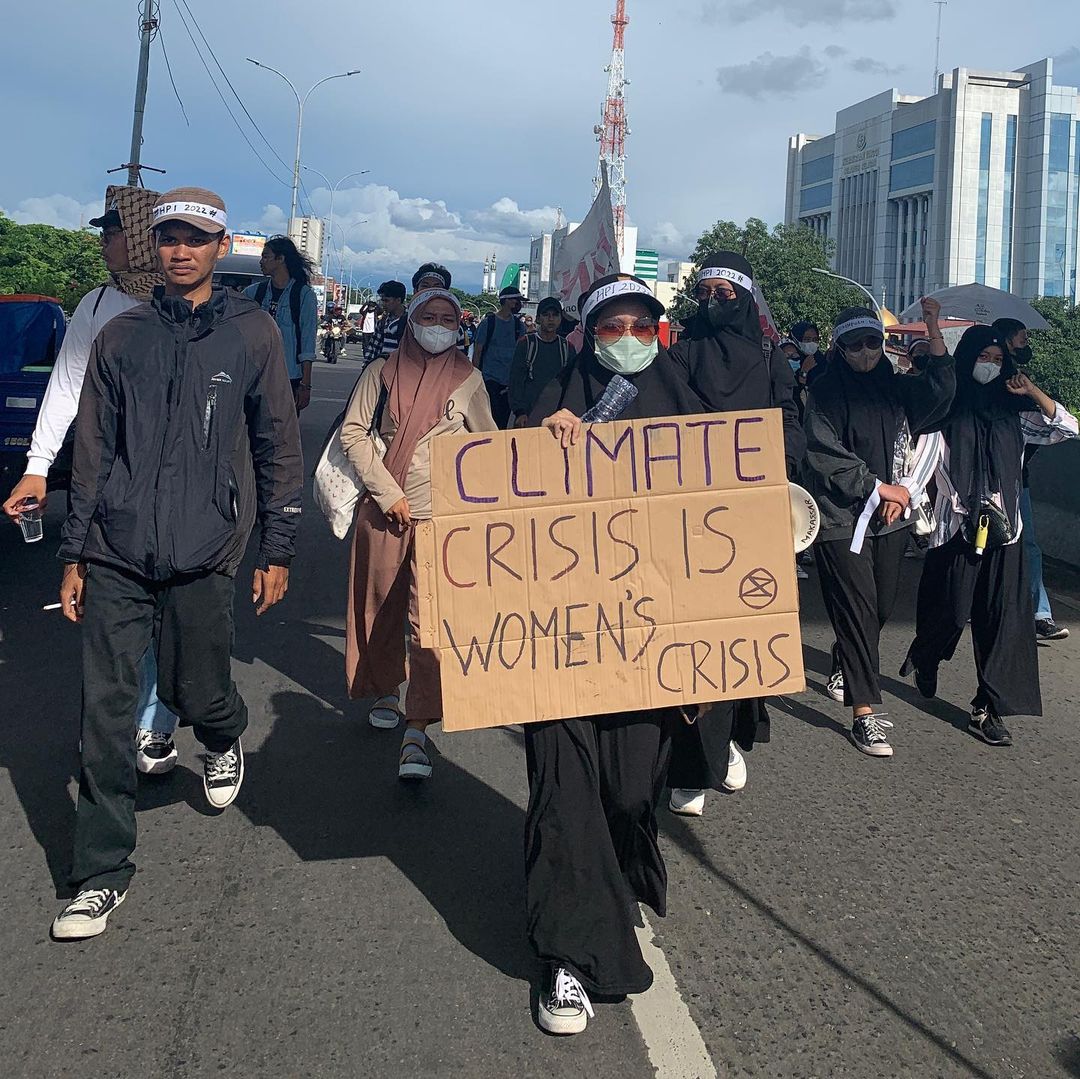
Indonesian women rebels of XR Makassar march as part of Women’s Climate Strike.
Why does climate change affect women more than men? What’s it like being a woman on the frontline of the climate crisis? How are women fighting back against systemic oppression? How should men evolve to bring about the post-capitalist eco-feminist future we all want and need? Read on rebel, read on…
Global Citizen: Understanding Why Climate Change Impacts Women More Than Men
Women are disproportionately affected by extreme weather events, and the climate crisis is exacerbating gender inequality around the world. This article clearly and succinctly explains why, using case studies and even the Paris Agreement to prove its claims.
XR Sheffield: International Women’s Day: A Congolese Climate Activist Speaks
For International Women’s Day, a woman rebel from the UK asked a woman rebel in the Democratic Republic of Congo about her experiences as an activist on the frontline of the Climate Crisis.
Vimeo: Letter to Shaheen Bagh (12 mins)
This moving short documentary explores a recent women-led protest movement in India against a law that removes citizenship rights from the country’s Muslim population. The film was screened on International Women’s Day at the Human Screen Film Festival in Tunisia.
Spotify: Sustainable Masculinities and Degrowth
Men have played a key role in developing, benefiting from and upholding a global system that has exploited peoples and ecosystems all over the planet. This podcast asks a deceptively simple question: what does a non-exploitative type of masculinity look like? To put it another way, what should it mean to be ‘male’ in a post-capitalist, eco-feminist world?
Book of the Month
Animal, Vegetable, Miracle: A Year of Food Living: 10th Anniversary Edition, by Barbara Kingsolver, with Steven L. Hopp, Camille Kingsolver, and Lily Hopp Kingsolver
The original Animal, Vegetable, Miracle was a charming memoir about a family’s attempt to live on mostly locally-sourced food for a year. It includes lots of insightful, well-informed discussion of how and why, alongside family stories heart-warming and otherwise.
That the primary author, the mother of the family, was already an accomplished and well-known novelist certainly helped give the book its voice and its reach—this memoir is one of several simultaneous (and independent) launch-points for what has become the localvore movement. The tenth anniversary edition (now itself five years old) adds new chapters from each family member, including those who were children last time around.
So why recommend it here? And why now?
Simply put, without fossil fuel, we will again depend mostly on local foods. Kingsolver and her family show us how that might work, and how it might be good.
And since finding and preparing food is still, for better or worse, 'women’s work' in many families, this month is a great time to explore how such labour, at home, can be its own powerful form of rebellion.
Avoid Amazon. Support local bookshops by buying your books at Bookshop or Hive.
Humans of XR:
Shamim, Tanzania

Sometimes people ask me, “Who do you work for?” I tell them that I work for the environment. Then they say, “Is there an organisation called ‘Environment’?” I’m not employed by anybody. Last year, I quit my job so I could find my purpose. The only thing I find joy in doing is serving the environment: going into jungles, planting trees, cleaning up beaches…
I live in Dar es Salaam, one of the bigger cities in Tanzania and among the fastest growing in Africa. Most people at least know about climate change here. But when you go to other regions, people have no idea. People say they don’t see it, but it’s happening now. We’re supposed to have rains starting now, but so far only a few regions have rain.
The most inspirational thing in my life is Mount Kilimanjaro. I call it “the fragile beauty”. If we don’t look after that mountain, we are all doomed, because it’s a big supply of drinking water to the Tanzanian population and of value to East Africa. If we don’t take care of the glaciers, they could melt away within the next few decades. According to the UN, we can reduce water shortages in East Africa by reforesting Mount Kilimanjaro.
Mount Kilimanjaro also inspired me to come up with ‘Trees for Birthdays’. . If someone is turning 30, we plant 30 trees to help reforest the mountain; for someone turning 50, we plant 50 trees. I track the trees to make sure they grow to maturity. I wish everyone could do this – imagine a world where everyone planted trees on their birthday!
I believe women are the most affected when it comes to climate change. A UN report said that if women had the same access to productive resources as men, their farms would increase yields by 20 to 30 percent, raising total agricultural output in developing countries 2.5 to 4 percent.
If women don’t take responsibility right now, then future generations will be affected. As a woman, I feel that I have the responsibility to fight for inclusion.
If you know (or are) a rebel somewhere in the world with a story to tell, get in touch at [email protected]
Thank you
Eunice Foote was a physicist and women’s rights activist from New York. In 1856, years before the men credited with it, she discovered the greenhouse effect and theorised about global warming.
Thank you for reading, rebel. If you have any questions or feedback, we want to hear from you. Get in touch at [email protected].
We are in a crucial phase of human history, and our movement needs money to make our message heard. Anything you can give is appreciated.
